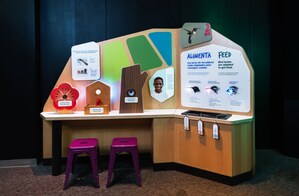Pacific Science Center Teams Up with AWS and the Seattle Kraken to Light Up its Iconic Arches as Part of the Game-Day Experience
Dazzling, cloud-powered light displays will spread the excitement of Kraken games throughout the Seattle area
SEATTLE, Oct. 20, 2021 /PRNewswire/ -- Pacific Science Center (PacSci) today announced a collaboration with Amazon Web Services (AWS) and the Seattle Kraken to build a new, state-of-the-art lighting system within the iconic arches on its Seattle Center campus, powered by AWS. The new energy-efficient system enables PacSci's arches to share the excitement of the Kraken with the entire Seattle area through special choreographed lighting displays before, during and after home games at night. The lights will be activated for a game-time show, with a vivid "goal light" celebration every time the Kraken score a goal during a night game at Climate Pledge Arena, also part of the Seattle Center campus. This new lighting system creates opportunities for collaboration with other organizations and artists, adding to the new energy and life of the Seattle Center campus.
"For nearly 60 years, PacSci's iconic arches have been a historic and beloved part of the Seattle community," said Todd Weatherby, Vice President of Professional Services at AWS. "AWS is thrilled to help Pacific Science Center leverage the power of the cloud to further enhance the arches and extend the game-day excitement to the Seattle community at large."
The new lighting system works by pulling live Seattle Kraken game information from Sportsdata.io, a sports data provider, onto AWS in near real time. Once the game information is processed by AWS Lambda (a serverless compute service), Amazon Simple Queue Service (SQS) triggers the Pacific Science Center's lighting controller to initiate a custom lighting sequence when a home game goal is scored by the Kraken.
"We're thrilled to relight the arches with a new state-of-the-art, cloud-based system that enables this collaboration with the Seattle Kraken. This is an exciting step forward in PacSci's continued renewal and renovation," said Will Daugherty, president and CEO of Pacific Science Center. "Our work with AWS allows us to leverage the power of the cloud to participate in the celebration among all Kraken fans of the team's first season. We're excited about the possibilities, and this is just the beginning."
PacSci and its iconic arches were built by esteemed local architect Minoru Yamasaki for the 1962 Seattle World's Fair. At 132 feet high, the white cement structure consists of five arches that soar high enough to be seen throughout the city of Seattle. The arches feature 25 energy-efficient lights with endless LED color display options. This new lighting system will debut in October and will be primed for a spectacular evening when the Kraken play their first night game in Climate Pledge Arena.
"We're excited to have a high-impact, dynamic representation of the action on the ice that can be shared with fans across the city, in near real time, on the iconic arches at PacSci," said Jonny Greco, Senior Vice President, Live Entertainment & Game Presentation at Seattle Kraken. "We look forward to celebrating our first home goal, and many more, through this collaboration with PacSci and AWS."
Lighting options include:
- Special pre-game lighting displays to build excitement throughout the Seattle area, especially for fans heading to the game.
- Choreographed displays designed in collaboration with the Kraken to share the energy inside Climate Pledge Arena with everyone in the area, including celebrations of goals and wins.
- Additional special lighting routines incorporating Kraken team colors and themes.
- Opportunities for future custom lighting displays to increase visibility for other organizations, causes, and issues.
The collaboration and arch lighting are an exciting part of PacSci's renewal as well as the revitalization of Seattle Center, which includes the debut of Climate Pledge Arena, Seattle Kraken's inaugural season and the Monorail's recent update. No matter where fans and residents are around the city, they can celebrate and look to the arch lights for a sense of community. To learn more about the collaboration and PacSci's arches, visit www.pacsci.org.
Pacific Science Center is an independent, not-for-profit institution in Seattle and has been a gateway to access science education and innovation for early 60 years. The institution's mission is to ignite curiosity in every child and fuel a passion for discovery, experimentation, and critical thinking in all of us. Prior to COVID-19, Pacific Science Center's award-winning, interactive programs reached nearly 1 million people each year – in their communities across the state of Washington, classrooms, and on the Seattle Center campus and at Mercer Slough Environmental Education Center in Bellevue. During the period of reduced onsite operations due to COVID-19, Pacific Science Center continued to serve the community through digital and virtual programming. Pacific Science Center began as the United States Science Pavilion during the 1962 Seattle World's Fair. Millions came to explore the wonders of science during the World's Fair and after closing, the Science Pavilion was given new life as the private not-for-profit Pacific Science Center, the first U.S. museum founded as a science and technology center. On July 22, 2010, Pacific Science Center was declared a City of Seattle Landmark.
SOURCE Pacific Science Center

Related Links
WANT YOUR COMPANY'S NEWS FEATURED ON PRNEWSWIRE.COM?
Newsrooms &
Influencers
Digital Media
Outlets
Journalists
Opted In






Share this article